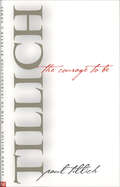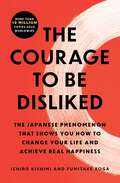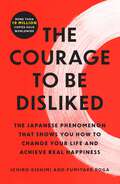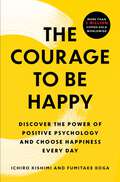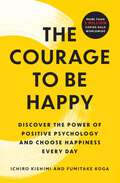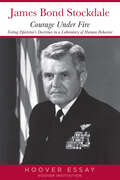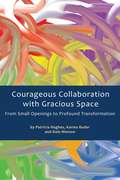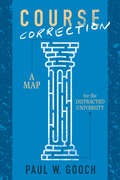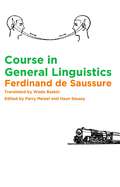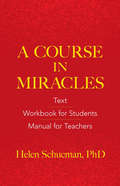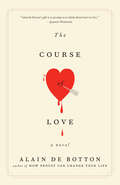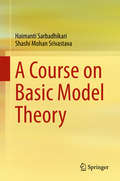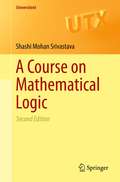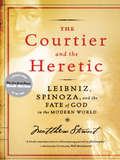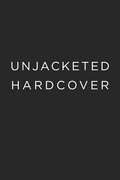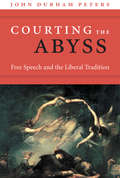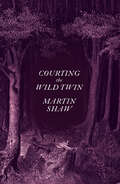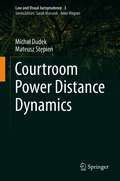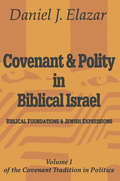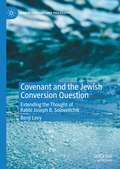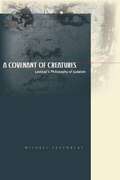- Table View
- List View
The Courage to Be: Second Edition (The Terry Lectures Series)
by Paul TillichThe imminent philosopher and theologian examines religion in light of science and philosophy in modern society. Originally published more than fifty years ago, The Courage to Be has become a classic of twentieth-century religious and philosophical thought. The great Christian existentialist thinker Paul Tillich describes the dilemma of modern man and points a way to the conquest of the prob-lem of anxiety. This edition includes a new introduction by Harvey Cox that situates the book within the theological conversation into which it first appeared and conveys its continued rele-vance in the current century.&“The brilliance, the wealth of illustration, and the aptness of personal application…make the reading of these chapters an exciting experience.&”—W. Norman Pittenger, New York Times Book Review &“The essential character of courage, for Tillich, is &“in spite of.&” We must go on striving for freedom, justice, and our faith in spite of oppositions. In this age of late capitalism, globalization, and terrorism, we all need the virtue of courage as Harvey Cox admirably argues in the foreword.&”—Nimi Wariboko, Andover Newton Theological School, Newton Centre, MA "Tillich struggled with the existential question how we may overcome the demoralizing effects, on the individual and society, of our Age of Anxiety. In this, his most popular book, Tillich gives us his deeply thought answers, and Harvey Cox provides a helpful new introduction."—Gerald Holton, Harvard University
The Courage to Be Disliked: The Japanese Phenomenon That Shows You How to Change Your Life and Achieve Real Happiness
by Ichiro Kishimi Fumitake KogaThe Life-Changing Magic of Tidying Up for the mind, The Courage to Be Disliked is the Japanese phenomenon that shows you how to free yourself from the shackles of past experiences and others’ expectations to achieve real happiness.The Courage to Be Disliked, already an enormous bestseller in Asia with more than 3.5 million copies sold, demonstrates how to unlock the power within yourself to be the person you truly want to be. Using the theories of Alfred Adler, one of the three giants of twentieth century psychology, this book follows an illuminating conversation between a philosopher and a young man. The philosopher explains to his pupil how each of us is able to determine our own life, free from the shackles of past experiences, doubts, and the expectations of others. It’s a way of thinking that is deeply liberating, allowing us to develop the courage to change, and to ignore the limitations that we and those around us have placed on ourselves. The result is a book that is both highly accessible and profound in its importance. Millions have already read and benefitted from its wisdom. This is a truly special book in the vein of Marie Kondo’s The Life-Changing Magic of Tidying Up but for the mind. Those ready to embrace the insights and liberation promised by The Courage to Be Disliked will come to a deeper understanding of themselves and others, and find the inspiration to take the reins of their own life.
The Courage to Be Disliked: The Japanese Phenomenon That Shows You How to Change Your Life and Achieve Real Happiness
by Ichiro Kishimi Fumitake KogaAn international bestseller and TikTok sensation with more than 10 million copies sold worldwide, The Courage to Be Disliked is a transformative and practical guide to personal happiness and self-fulfillment.Now you can unlock your full potential and free yourself from the shackles of past traumas and societal expectations to find true personal happiness. Based on the theories of renowned psychologist Alfred Adler, this book guides you through the principles of self-forgiveness, self-care, and mind decluttering in a straightforward, easy-to-digest style that&’s accessible to all.The Courage to Be Disliked unfolds as a dialogue between a philosopher and a young man, who, over the course of five enriching conversations, realizes that each of us is in control of our life&’s direction, independent of past burdens and expectations of others. Wise, empowering, and profoundly liberating, this book is a life-changing experience that shows you a path to lasting happiness and how to finally be the person you truly want to be. Millions are already benefiting from its teachings—and you can be next.
The Courage to Be Disliked: The Japanese Phenomenon That Shows You How to Change Your Life and Achieve Real Happiness
by Ichiro Kishimi Fumitake KogaThe Life-Changing Magic of Tidying Up for the mind, The Courage to Be Disliked is the Japanese phenomenon that shows you how to free yourself from the shackles of past experiences and others&’ expectations to achieve real happiness.The Courage to Be Disliked, already an enormous bestseller in Asia with more than 3.5 million copies sold, demonstrates how to unlock the power within yourself to be the person you truly want to be. Using the theories of Alfred Adler, one of the three giants of twentieth century psychology, this book follows an illuminating conversation between a philosopher and a young man. The philosopher explains to his pupil how each of us is able to determine our own life, free from the shackles of past experiences, doubts, and the expectations of others. It&’s a way of thinking that is deeply liberating, allowing us to develop the courage to change, and to ignore the limitations that we and those around us have placed on ourselves. The result is a book that is both highly accessible and profound in its importance. Millions have already read and benefitted from its wisdom. This is a truly special book in the vein of Marie Kondo&’s The Life-Changing Magic of Tidying Up but for the mind. Those ready to embrace the insights and liberation promised by The Courage to Be Disliked will come to a deeper understanding of themselves and others, and find the inspiration to take the reins of their own life.
The Courage to Be Happy: The Japanese Phenomenon That Shows You That True Contentment Is Within Your Power
by Ichiro Kishimi Fumitake KogaIn this follow-up to the international phenomenon The Courage to Be Disliked, discover how to reconnect with your true self, experience true happiness, and live the life you want. What if one simple choice could unlock your destiny? Already a major Japanese bestseller, this eye-opening and accessible follow-up to the &“compelling&” (Marc Andreessen) international phenomenon The Courage to Be Disliked shares the powerful teachings of Alfred Adler, one of the giants of nineteenth-century psychology, through another illuminating dialogue between the philosopher and the young man. Three years after their first conversation, the young man finds himself disillusioned and disappointed, convinced Adler&’s teachings only work in theory, not in practice. But through further discussions, the philosopher and the young man deepen their own understandings of Adler&’s powerful teachings and learn the tools needed to apply them to the chaos of everyday life. To be read on its own or as a companion to the bestselling first book, The Courage to Be Happy reveals a bold new way of thinking and living, empowering you to let go of the shackles of past trauma and the expectations of others, and to use this freedom to create the life you truly desire. Plainspoken yet profoundly moving, The Courage to Be Happy will illuminate your life and brighten the world as we know it. Discover the courage to choose happiness.
The Courage to Be Happy: Discover the Power of Positive Psychology and Choose Happiness Every Day
by Ichiro Kishimi Fumitake KogaIn this follow-up to the international bestseller and TikTok sensation The Courage to Be Disliked, discover how to reconnect with your true self, experience true happiness, and live the life you want. What if one simple choice could unlock your destiny? Already a major international bestseller, this eye-opening and accessible follow-up to the &“compelling&” (Marc Andreessen) worldwide phenomenon The Courage to be Disliked shares the powerful teachings of Alfred Adler, one of the giants of 19th-century psychology, through another illuminating dialogue between the philosopher and the young man. Three years after their first conversation, the young man finds himself disillusioned and disappointed, convinced Adler&’s teachings only work in theory, not in practice. But through further discussions between the philosopher and the young man, they deepen their own understandings of Adler&’s powerful teachings, and learn the tools needed to apply Adler&’s teachings to the chaos of everyday life. To be read on its own or as a companion to the bestselling first book, The Courage to Be Happy reveals a bold new way of thinking and living, empowering you to let go of the shackles of past trauma and the expectations of others, and to use this freedom to create the life you truly desire. Plainspoken yet profoundly moving, reading The Courage to Be Happy will light a torch with the power to illuminate your life and brighten the world as we know it. Now you can discover the courage to choose happiness.
Courage Under Fire: Testing Epictetus's Doctrines in a Laboratory of Human Behavior (Hoover Institution Press Publication #6)
by James B. StockdaleWhen physical disability from combat wounds brought about Jim Stockdale's early retirement from military life, he had the distinction of being the only three-star officer in the history of the navy to wear both aviator wings and the Congressional Medal of Honor. His writings have been many and varied, but all converge on the central theme of how man can rise with dignity to prevail in the face of adversity.
Courageous Collaboration with Gracious Space
by Patricia M. Hughes Karma Ruder Dale NienowEbook edition of "Courageous Collaboration with Gracious Space. "
Course Correction: A Map for the Distracted University (UTP Insights)
by Paul W. GoochCourse Correction engages in deliberation about what the twenty-first-century university needs to do in order to re-find its focus as a protected place for unfettered commitment to knowledge, not just as a space for creating employment or economic prosperity. The university’s business, Paul W. Gooch writes, is to generate and critique knowledge claims, and to transmit and certify the acquisition of knowledge. In order to achieve this, a university must have a reputation for integrity and trustworthiness, and this, in turn, requires a diligent and respectful level of autonomy from state, religion, and other powerful influences. It also requires embracing the challenges of academic freedom and the effective governance of an academic community. Course Correction raises three important questions about the twenty-first-century university. In discussing the dominant attention to student experience, the book asks, "Is it now all about students?" Secondly, in questioning "What knowledge should undergraduates gain?" it provides a critique of undergraduate experience, advocating a Socratic approach to education as interrogative conversation. Finally, by asking "What and where are well-placed universities?" the book makes the case against placeless education offered in the digital world, in favour of education that takes account of its place in time and space.
Course in General Linguistics (Bloomsbury Revelations Ser.)
by Ferdinand de SaussureThe founder of modern linguistics, Ferdinand de Saussure inaugurated semiology, structuralism, and deconstruction and made possible the work of Jacques Derrida, Roland Barthes, Michel Foucault, and Jacques Lacan, thus enabling the development of French feminism, gender studies, New Historicism, and postcolonialism. Based on Saussure's lectures, Course in General Linguistics (1916) traces the rise and fall of the historical linguistics in which Saussure was trained, the synchronic or structural linguistics with which he replaced it, and the new look of diachronic linguistics that followed this change. Most important, Saussure presents the principles of a new linguistic science that includes the invention of semiology, or the theory of the "signifier," the "signified," and the "sign" that they combine to produce.This is the first critical edition of Course in General Linguistics to appear in English and restores Wade Baskin's original translation of 1959, in which the terms "signifier" and "signified" are introduced into English in this precise way. Baskin renders Saussure clearly and accessibly, allowing readers to experience his shift of the theory of reference from mimesis to performance and his expansion of poetics to include all media, including the life sciences and environmentalism. An introduction situates Saussure within the history of ideas and describes the history of scholarship that made Course in General Linguistics legendary. New endnotes enlarge Saussure's contexts to include literary criticism, cultural studies, and philosophy.
Course in General Linguistics
by Ferdinand De Saussure Wade Baskin Perry Meisel Haun SaussyThis new edition of Ferdinand de Saussure'sCourse in General Linguistics (1916) is the first critical edition of Saussure to appear in English. It also restores Wade Baskin's delightful original English translation (1959), which has long been unavailable. The founder of modern linguistics, Saussure inaugurated semiology, structuralism, and deconstruction and made possible the work of Jacques Lacan, French feminism, cultural studies, New Historicism, and postcolonialism. Based on the lectures that Saussure gave at the end of his life at the University of Geneva, the text of theCoursewas collated from notes taken by Saussure's students and published by Charles Bally, Albert Sechehaye, and Albert Riedlinger. Saussure traces the rise and fall of the historical linguistics in which he was trained, the synchronic or structural linguistics with which he replaces it, and the new look of diachronic linguistics subsequent to this change in scholarly perspective. Most important, Saussure presents the general principles of a new linguistic science which includes among its achievements the invention of semiology: the theory of the "signifier," the "signified," and the "sign" which they combine to produce. Relaunching Baskin's translation restores these terms and makes Saussure's thought once again clear and accessible. Baskin's translation allows readers to experience how Saussure shifts the theory of reference from mimesis to performance and expands the purview of poetics to include all media, including life sciences and environmentalism. The introduction to this new edition situates Saussure's position in the history of ideas and describes the history of scholarship that made theCourse in General Linguisticslegendary. New endnotes enlarge Saussure's contexts well beyond linguistics to include literary criticism, cultural studies, and philosophy.
A Course in Miracles: Text, Workbook for Students, Manual for Teachers
by Helen Schucman PhDA Course in Miracles is the acclaimed spiritual guide that teaches the way to universal love and peace is by undoing guilt through forgiving others. The "miracles" of the title refers to shifts in perception from fear to love, which fosters the healing and sanctification of relationships. Although expressed in terms of traditional Christianity, this life-changing work constitutes nonsectarian, universal spiritual teachings.The three-part approach begins with an explanation of the course's theory and the development of the experience of forgiveness. The second consists of a workbook, comprising 365 lessons — an exercise for each day of the year — intended to influence students' perceptions. The third section presents a manual for teachers, in which the question-and-answer format provides responses for likely inquiries as well as definitions for terms used throughout the course. Written by Dr. Helen Schucman, a clinical and research psychologist, and edited by her colleague at Columbia University, Dr. William Thetford, from 1965 to 1970, A Course in Miracles has been translated into more than 20 languages and sold millions of copies around the world.
The Course of Love
by Alain De BottonIn Edinburgh, a couple, Rabih and Kirsten, fall in love. They get married, they have children -- but no relationship is as simple as "happily ever after." The Course of Love is a novel that explores what happens after the birth of love, what it takes to maintain love, and what happens to our original ideals under the pressures of an average existence. With philosophical insight and psychological acumen, Alain de Botton shows that our Romantic dreams may do us a grave disservice -- and explores what the alternatives might be. The conclusion, as the characters gradually discover, is that love is not "an enthusiasm," but rather a "skill" that must be slowly and often painfully learnt. This is a Romantic novel in the true sense, one interested in exploring how love can survive and thrive in the long term.
A Course on Basic Model Theory
by Shashi Mohan Srivastava Haimanti SarbadhikariThis self-contained book is an exposition of the fundamental ideas of model theory. It presents the necessary background from logic, set theory and other topics of mathematics. Only some degree of mathematical maturity and willingness to assimilate ideas from diverse areas are required. The book can be used for both teaching and self-study, ideally over two semesters. It is primarily aimed at graduate students in mathematical logic who want to specialise in model theory. However, the first two chapters constitute the first introduction to the subject and can be covered in one-semester course to senior undergraduate students in mathematical logic. The book is also suitable for researchers who wish to use model theory in their work.
A Course on Mathematical Logic (Universitext)
by Shashi Mohan SrivastavaThis is a short, modern, and motivated introduction to mathematical logic for upper undergraduate and beginning graduate students in mathematics and computer science. Any mathematician who is interested in getting acquainted with logic and would like to learn Gödel's incompleteness theorems should find this book particularly useful. The treatment is thoroughly mathematical and prepares students to branch out in several areas of mathematics related to foundations and computability, such as logic, axiomatic set theory, model theory, recursion theory, and computability. In this new edition, many small and large changes have been made throughout the text. The main purpose of this new edition is to provide a healthy first introduction to model theory, which is a very important branch of logic. Topics in the new chapter include ultraproduct of models, elimination of quantifiers, types, applications of types to model theory, and applications to algebra, number theory and geometry. Some proofs, such as the proof of the very important completeness theorem, have been completely rewritten in a more clear and concise manner. The new edition also introduces new topics, such as the notion of elementary class of structures, elementary diagrams, partial elementary maps, homogeneous structures, definability, and many more.
The Courtier and the Heretic: Leibniz, Spinoza, and the Fate of God in the Modern World
by Matthew Stewart"A colorful reinterpretation. . . . Stewart's wit and profluent prose make this book a fascinating read."--Publishers Weekly, starred review Philosophy in the late seventeenth century was a dangerous business. No careerist could afford to know the reclusive, controversial philosopher Baruch de Spinoza. Yet the wildly ambitious genius Gottfried Wilhelm Leibniz, who denounced Spinoza in public, became privately obsessed with Spinoza's ideas, wrote him clandestine letters, and ultimately met him in secret. "In refreshingly lucid terms" (Booklist) Matthew Stewart "rescues both men from a dusty academic shelf, bringing them to life as enlightened humans" (Library Journal) central to the religious, political, and personal battles that gave birth to the modern age. Both men put their faith in the guidance of reason, but one spent his life defending a God he may not have believed in, while the other believed in a God who did not need his defense. Ultimately, the two thinkers represent radically different approaches to the challenges of the modern era. They stand for a choice that we all must make.
The Courtier and the Heretic: Leibniz, Spinoza, and the Fate of God in the Modern World
by Matthew StewartStewart contrasts the thinking of Gottfried Wilhelm Leibniz (1646-1716), the toast of Paris and inventor of calculus, with that of Benedictus Spinoza (1632-77), who lived in The Hague as an outcast with a day job. In their ideas he finds the seeds both of modernity and of the conflicts that still rage through it. Annotation ©2006 Book News, Inc., Portland, OR
Courting Conflict: The Israeli Military Court System in the West Bank and Gaza
by Lisa HajjarThis book provides a rare look at an institution that lies both figuratively and literally at the center of the Israeli-Palestinian conflict. Lisa Hajjar has conducted in-depth interviews with dozens of Israelis and Palestinians--including judges, prosecutors, defense lawyers, defendants, and translators--about their experiences and practices to explain how this system functions, and how its functioning has affected the conflict.
Courting the Abyss: Free Speech and the Liberal Tradition
by John Durham PetersCourting the Abyss updates the philosophy of free expression for a world that is very different from the one in which it originated. The notion that a free society should allow Klansmen, neo-Nazis, sundry extremists, and pornographers to spread their doctrines as freely as everyone else has come increasingly under fire. At the same time, in the wake of 9/11, the Right and the Left continue to wage war over the utility of an absolute vision of free speech in a time of increased national security. Courting the Abyss revisits the tangled history of free speech, finding resolutions to these debates hidden at the very roots of the liberal tradition. A mesmerizing account of the role of public communication in the Anglo-American world, Courting the Abyss shows that liberty's earliest advocates recognized its fraternal relationship with wickedness and evil. While we understand freedom of expression to mean "anything goes," John Durham Peters asks why its advocates so often celebrate a sojourn in hell and the overcoming of suffering. He directs us to such well-known sources as the prose and poetry of John Milton and the political and philosophical theory of John Locke, Adam Smith, John Stuart Mill, and Oliver Wendell Holmes Jr., as well as lesser-known sources such as the theology of Paul of Tarsus. In various ways they all, he shows, envisioned an attitude of self-mastery or self-transcendence as a response to the inevitable dangers of free speech, a troubled legacy that continues to inform ruling norms about knowledge, ethical responsibility, and democracy today. A world of gigabytes, undiminished religious passion, and relentless scientific discovery calls for a fresh account of liberty that recognizes its risk and its splendor. Instead of celebrating noxious doctrine as proof of society's robustness, Courting the Abyss invites us to rethink public communication today by looking more deeply into the unfathomable mystery of liberty and evil.
Courting the Wild Twin
by Martin ShawMaster mythologist Martin Shaw uses timeless story-wisdom to examine our broken relationship with the world There is an old legend that says we each have a wild, curious twin that was thrown out the window the night we were born, taking much of our vitality with them. If there was something we were meant to do with our few, brief years on Earth, we can be sure that the wild twin is holding the key. In Courting the Wild Twin, Dr. Martin Shaw invites us to seek out our wild twin––a metaphor for the part of ourselves that we generally shun or ignore to conform to societal norms––to invite them back into our consciousness, for they have something important to tell us. He challenges us to examine our broken relationship with the world, to think boldly, wildly, and in new ways about ourselves—as individuals and as a collective. Through the use of scholarship, storytelling, and personal reflection, Shaw unpacks two ancient European fairy tales that concern the mysterious wild twin. By reading these tales and becoming storytellers ourselves, he suggests we can restore our agency and confront modern challenges with purpose, courage, and creativity. Courting the Wild Twin is a declaration of literary activism and an antidote to the shallow thinking that typifies our age. Shaw asks us to recognize mythology as a secret weapon—a radical, beautiful, heart-shuddering agent of deep, lasting change.
Courting the Wild Twin
by null Martin Shaw"Fabulous."—Dan Richards, author of Holloway"Terrifically strange and thrilling."—Melissa Harrison, author of All Among the Barley"A modern-day bard."—Madeline Miller, author of CirceThis is a book of literary activism – an antidote to the shallow thinking that typifies our age. In Courting the Wild Twin, acclaimed scholar, mythologist and author of Smoke Hole and Bardskull, Martin Shaw unravels two ancient European fairy tales concerning the mysterious &‘wild twin&’ located deep inside all of us. By reading these tales and becoming storytellers ourselves, he challenges us to confront modern life with purpose, courage, and creativity.Martin summons the reader to the "ragged edge of the dark wood" to seek out this estranged, exiled self – the part we generally shun or ignore to conform to societal norms – and invite it back into our consciousness. If there was something we were meant to do with our few, brief years on Earth, we can be sure that our wild twin is holding the key.After all, stories are our secret weapons – and they might just save us.
Courtroom Power Distance Dynamics (Law and Visual Jurisprudence #3)
by Michał Dudek Mateusz StępieńThe book presents a comprehensive reconceptualization of Geert Hofstede’s well-known concept of power distance, applying the theory to the specific case of judge–witness courtroom interactions in Polish regional courts. In the light of the detailed critique of Hofstede’s original approach to power distance, the book first carefully develops a three-level concept of power distance, including personal preferences concerning the realization of power relations (subjective level); rules, practices and spatio-architectural arrangements underlying power relations (organizational level); and individual demeanors that can, in practice, increase or decrease the asymmetry between parties to a power relation (interactional level). This reconceptualization provides a universal conceptual apparatus that is applicable to various social settings, but the authors have used it in extensive qualitative and quantitative research focused on courtroom interactions. After laying the theoretical foundations, the book details the elements of judge–witness courtroom interactions (both verbal and non-verbal) that contribute to establishing power distance between judge and witness. These were identified over 6 months of observational research conducted in 2018 in the Kraków regional courts. Lastly, the book addresses the issue of the relationship between the subjective level of power distance and opinions that laypeople can have concerning a judge’s demeanor in the courtroom environment. To do so, it describes specific quantitative research that involved the creation of original film clips depicting witness questioning by the judge in a courtroom in three power distance situations. Offering a coherent framework for examining various interpersonal relations in legal contexts and illustrating how the framework can be applied on the courtroom interactions example, the book will appeal to a wide range of legal practitioners and academics. It also allows scientists outside the legal field to gain a new and broad understanding of power distance that they can easily apply in their respective fields. Furthermore, it provides non-academics with insights into courtroom interactional dynamics, as exemplified by the discussion of Polish judicial practice.
Covenant and Polity in Biblical Israel: Volume 1, Biblical Foundations and Jewish Expressions: Covenant Tradition in Politics (The Covenant Tradition in Politics)
by Daniel J. ElazarIn this first volume of a trilogy, Daniel J. Elazar addresses political uses of the idea of covenant, the tradition that has adhered to that idea, and the political arrangements that flow from it,Among the topics covered are covenant as a political concept, the Bible as a political commentary, the post-biblical tradition, medieval covenant theory, and Jewish political culture.
Covenant and the Jewish Conversion Question: Extending the Thought of Rabbi Joseph B. Soloveitchik (Jewish Thought and Philosophy)
by Benji LevyCovenant and the Jewish Conversion Question reevaluates conversion and Jewish identity through the lens of Rabbi Joseph B. Soloveitchik’s dual conception of the Covenants of Fate and Destiny. By studying an array of key rabbinic texts through this lens, the book explores the boundaries and interplay between these biblical covenants through apostasy, holiness and the key elements relating to conversion law. This understanding provides a relevant framing device to deal with the conversion and Jewish identity crises faced in the State of Israel and beyond.
A Covenant of Creatures: Levinas's Philosophy of Judaism
by Michael Fagenblat"I am not a particularly Jewish thinker," said Emmanuel Levinas, "I am just a thinker." This book argues against the idea, affirmed by Levinas himself, that Totality and Infinity and Otherwise Than Being separate philosophy from Judaism. By reading Levinas's philosophical works through the prism of Judaic texts and ideas, Michael Fagenblat argues that what Levinas called "ethics" is as much a hermeneutical product wrought from the Judaic heritage as a series of phenomenological observations. Decoding the Levinas's philosophy of Judaism within a Heideggerian and Pauline framework, Fagenblat uses biblical, rabbinic, and Maimonidean texts to provide sustained interpretations of the philosopher's work. Ultimately he calls for a reconsideration of the relation between tradition and philosophy, and of the meaning of faith after the death of epistemology.
